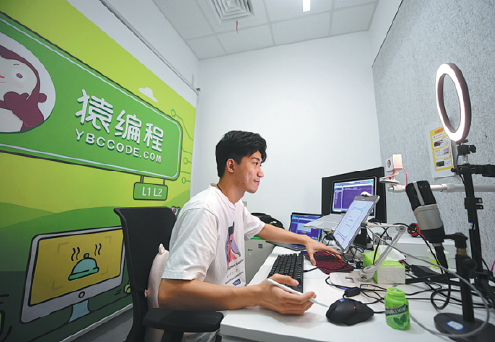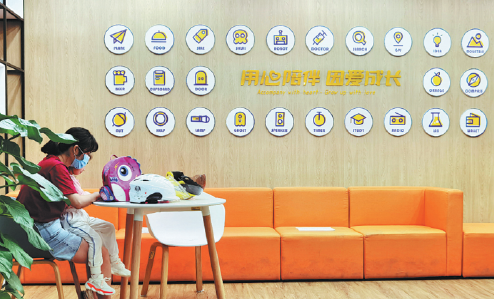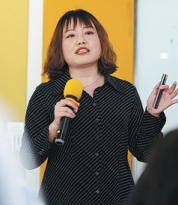TUTORING IRREGULARITIES PROMPT CRACKDOWN

Companies face scrutiny after series of breaches
Concerted efforts are being made by the Chinese government to clamp down on the booming private tutoring industry, with experts saying tougher regulations and crackdowns on misconduct are expected.
Tutoring companies Zuoyebang and Yuanfudao, which are based in Beijing, were each fined 2.5 million yuan ($390,000) on May 10 by the city's market regulator for false and misleading promotion and advertising, according to a statement by the State Administration for Market Regulation.
Zuoyebang falsely claimed on its website that it is cooperating with the United Nations and also falsified users' evaluations, while Yuanfudao falsely claimed it offered one-on-one tutoring by head teachers.
The companies also falsified their teachers' experience, and during promotional events advertised online courses with misleading prices, the statement said.
Regulatory authorities will step up supervision of after-school education companies and crack down on their misconduct, it added.
The new clampdown follows concern over competition to ensure that children go to good schools, which has triggered anxiety among parents and students. Parents have also been unhappy with misconduct such as false advertising and difficulty in obtaining refunds for lesson fees.
During this year's annual two sessions political meetings in March, concerns were raised that too much after-school tutoring could affect students' physical and mental health.
Such fears were voiced by many deputies to the National People's Congress and members of the Chinese People's Political Consultative Conference National Committee, who called for stricter regulation of the sector. Some even suggested a ban be imposed on the tutoring industry.
President Xi Jinping emphasized "resolute rectification" of issues attracting widespread public attention in the education sector, along with behavior that harms people's interests in the name of education.
Joining national political advisers from the education, medical and health sectors for a joint group meeting during the two sessions, Xi stressed the importance of reforming the evaluation system and developing education that people are satisfied with.
Courses banned
The quick growth of the private education sector, driven by strong demand from parents and students, has attracted increased scrutiny.
Last month, the Beijing municipal administration for market regulation handed out fines of 500,000 yuan to online education companies GSX Techedu, Xueersi Online School, Koolearn and Gaosi for misleading customers with false advertising.
This month in Chongqing, 18 tutoring companies were named by the municipal education commission and the administration for market regulation after behavior that breached government requirements for after-school training, including teaching students material that was too advanced, false advertising and hiring teachers with no credentials.
To ensure students get enough sleep, the Ministry of Education recently reiterated that after-school tutoring companies should not assign homework to them and that courses should end before 8:30 pm.
The ministry also banned tutoring courses for kindergarten pupils and stressed that kindergartens should not teach primary school courses.
In February 2018, the ministry and three other government departments issued a guideline to regulate the after-school tutoring industry. Schools were banned from considering a child's extracurricular qualifications for enrollment, while tutoring companies were forbidden from engaging in exam-oriented tuition methods or hiring teachers from public schools.
In August 2018, the General Office of the State Council, China's Cabinet, issued a guideline aimed at regulating cram schools. Activities banned by the guideline included: teaching students advanced material in core subjects such as Chinese, math and English; assigning homework to students; organizing competitions in core subjects; and accepting advanced payment for more than three months of courses.
Chu Zhaohui, senior researcher at the National Institute of Education Sciences, said the requirements for tutoring companies remained the same. While previous regulations focused on such companies' credentials, the latest crackdown is aimed at more-specific violations.
Tutoring companies are expected to face greater scrutiny as different government departments make determined efforts to implement guidelines issued previously, Chu said.
However, as students still have to achieve high scores to gain admittance to good schools, they remain motivated to attend tutoring courses, he said.
Booming industry
Despite government determination to rein in the industry, strong demand among students for after-school tutoring has helped it grow rapidly.
The online tutoring business in China experienced rapid growth last year due to the pandemic, reaching 257 billion yuan, a year-on-year rise of 35.5 percent, according to market consultancy iResearch in Shanghai. The company estimated the industry would reach 490 billion yuan by 2024.
The overall market for K-12-kindergarten-to-12th grade after-school education-was worth about 800 billion yuan in 2019. The industry is expected to experience speedy expansion after setbacks last year during the pandemic, soaring to 1.4 trillion yuan by 2025, according to a report by consulting company Oliver Wyman and the National Institute of Education Sciences.
Yu Minhong, chairman of New Oriental Education and Technology, said that with a large amount of capital infusion, the education industry has grown quickly. For example, Yuanfudao raised $3.5 billion in three rounds of funding last year, while Zuoyebang raised $2.35 billion in two rounds.
Yu was quoted by Shanghai news outlet ThePaper as saying the instant benefits and quick success sought by investors do not work in the education industry, and a crackdown on online education, which is full of "chaotic misbehavior", is imminent.
Chen Zhiwen, editor-in-chief of online education portal EOL, said the business model for online tutoring companies does not make sense in either the short or long term and most of them have not made a profit.
They face two challenges-controlling new student acquisition costs and maximizing renewal rates. The companies attract parents and students with tuition costs for courses that cannot cover their business outgoings, Chen said.
They can only survive if they obtain more investment, and when this investment dries up, such companies are doomed to fail, he said.
Love-hate relationship
When Siwen, now a sixth-grade student in Beijing's Xicheng district, started primary school, she asked her parents to enroll her in tutoring courses to learn English, as many of her peers had already started to learn the language.
She has taken these courses for six years and is among the top students in her class. Siwen can speak fluent English and passed the Preliminary English Test in December, according to her mother, Zou Ye.
Although the family has spent 30,000 yuan a year on tutoring courses for English, Zou said she does not consider the money wasted, as it has helped her daughter improve her proficiency in the language.
"It is like a love-hate relationship. Although I wouldn't say Siwen enjoyed the classes, they have helped her academically," Zou said.
Zhou Sichen, the father of a 6-year-old daughter in Wuhan, Hubei province, has taken her to different tutoring classes since she was 3.
Each week, the girl attends courses in Chinese, English, math, piano, dancing, physical exercise and boxing. This semester, Zhou has signed her up for pinyin courses, as he was told by other parents that teachers in the first grade do not spend much time on such lessons.
Course tuition fees for his two daughters comprise a large proportion of the family budget, Zhou said, adding that he and his wife have significantly reduced spending on themselves to ensure they can afford the best education for their children.
Zhou holds a doctorate in journalism from Wuhan University, while his wife graduated in journalism from Huazhong University of Science and Technology. The two institutions are among the country's top universities.
"We considered not pushing our daughters academically and just letting them enjoy a happy schooling, but we are afraid they might end up at vocational secondary schools," Zhou said.
"If they do not have the scores to get into their dream universities, they might blame us."
Yin Guiling, who teaches English at a high school in Shenzhen, Guangdong province, said although the school has a busy schedule, some of her students still take tutoring courses during weekends in the hope of achieving high scores in the all-important national college entrance exam, or gaokao.
Many of the students who attend these courses paid little attention during school classes, and their scores have not improved much as a result of the additional studies, she said.
"If they do not want to learn at school, what makes their parents think they are willing to learn during tutoring courses?" Yin said.
Zhang Yu, vice-dean of Tsinghua University's Institute of Education, said the intense competition among students to take tutoring courses and learn ahead of the syllabus is not in line with the learning pattern for them and has had a serious adverse impact on the education system.
For example, when students learn mathematics that are too advanced for them, their brains are insufficiently mature for them to understand the underlying logic behind the knowledge, Zhang said in a China Central Television interview.
Instead, they have to rely on rote learning to remember answers. They also lose the opportunity to develop mathematical logic in learning new knowledge, she said.
Based on Zhang's research, students who have attended math tutoring courses in lower grades at primary school have slightly higher grades in the subject than their peers when they enter middle school.
However, in middle school, the former group improves more slowly than its peers, as the students have not developed the logic to learn new knowledge, she added.
zoushuo@chinadaily.com.cn



























